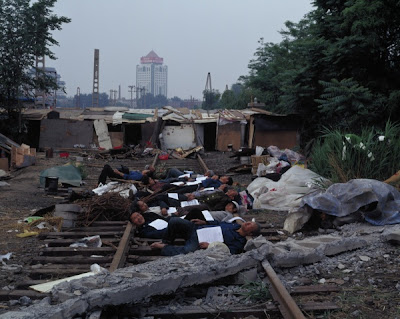The filmmaker (at right) has been working on this film for a dozen years -- since 1996. It shows -- and not simply because of his dedication. Some of the characters we meet literally grow up (or grow elderly) before our eyes. Early in the film, a man comes upon a leveled field that looks as though something might have stood there previously. "Petition Village?" another man inquires of the first, who answers yes. "They all want Petition Village," the second shakes his head. "It's been torn down."
Petitioning, it turns out, is what Chinese people do when their local authorities have -- due to fear, corruption, bribery, murder and the like -- let them down. They take their case to larger towns and finally to the largest, Beijing, to seek a redress which never, ever arrives. And yet, somehow, they believe that if they only keep pursuing, it will come. Along the way we see and hear horrible, unfair tales, none of which are redressed. Has there ever been a case of petitioning in which justice was served? If so, Mr. Zhao could not find it among his many petitioners.
A young man walking by a prison is needlessly beaten by its guards. This leads to an enforced hospital stay during which the patient recevies nothing that he needs, and so his muscles atrophy. He attempts to get redress, which only leads the beating of his brother, as well. A teacher who should have tenure is not given it. When he attempts to right this wrong, what is gets is bribery, forgery, the works. A mother named Qi, and her daughter (this is the pair with whom we spend the most time) have been trying for decades, but to no avail. The daughter, after years and years, finally decides to stop accompanying her mother on her petition drive. But mom has become so obsessed that she has turned herself into victim -- a devastating thing to see.
Through it all, Zhao's camera records so many scenes of protest, sadness and high drama, yet does it all so unobtrusively that this is one documentary the veracity of which I shall not question. Finally we see the 2008 Olympics and learn that no prisoners will be released until after this event. Along the way, we learn of the "retrievers" -- men who are paid by the local community to come and get the petitioners, beating them, kidnapping them, so that they will be able to bring no shame upon the local community. Finally prisoners are diagnosed as mentally ill. "They have made us irrational," one person notes, with more than a little irony, not to mention shame and anger. "It's difficult to comment on this society," notes another old woman, a former petitioner. Amen.
At the finale of this two-hour movie, the filmmaker tells, us via title cards, "I hope the wishes of the inexorable lives I've encountered will one day come true." In your dreams, Zhao Liang. Meanwhile, this shocking, amazing testament will play nightly, beginning Friday, January 14, at 6:30 and 9pm at Anthology Film Archives. Click here to see the complete AFA Calendar and here for ticket purchases.
*************
Also showing for four screenings is the director's 2007 documentary Crime and Punishment, which depicts Chinese military police and their "enforcement" of the law as they see fit. I had no time left to view this film, but if it is anywhere near the quality of Petition, then it is very good indeed. It will play at AFA for four screenings, Thursday, January 13 at 6:30 and 9pm, and Saturday and Sunday, January 15 and 16, at 4pm.








No comments:
Post a Comment